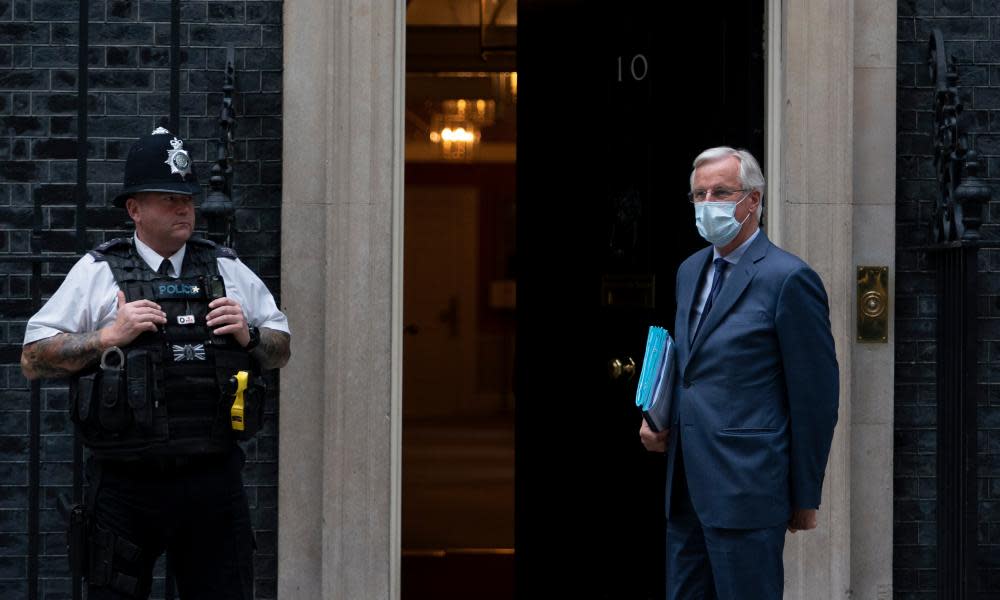UK Brexit negotiator meets EU counterpart in bid to revive talks

The government’s chief Brexit negotiator, David Frost, is to host his EU counterpart Michel Barnier for a private dinner in Downing Street on Tuesday evening in a bid to revive flagging talks on a trade and security deal.
Less than six months before the status quo transition period is due to end, both sides have expressed concern about the lack of progress in the negotiations.
Barnier and his team of officials arrived in London on Tuesday and posed for photos wearing face masks. Informal talks between about 15 officials on both sides will take place in Whitehall on Wednesday.
In London for talks: EU team led by @MichelBarnier arrived at St Pancras Station: constructive engagement for a 🇪🇺 🇬🇧 agreement pic.twitter.com/4Tl8tvi16J
— ValedeAlmeidaEU (@ValedeAlmeidaEU) July 7, 2020
The meeting follows the abrupt ending to the first round of “accelerated” face-to-face talks last week after which Barnier complained about a perceived lack of respect and engagement from the British government.
Asked what would be on the agenda, Boris Johnson’s official spokesman said: “They’re informal talks, so there is no published agenda, but you are fully aware of the range of issues that we need to reach agreement with the EU on. Discussions will cover everything from what the EU calls the level playing field, through to governance structures.”
Downing Street said Frost and Barnier would dine on halibut – perhaps surprising given that fish are one of the most contentious issues between the two sides.
In a transcript of an interview with Barnier by a Lords committee published earlier on Tuesday, the EU negotiator accused the UK of continuing to seek“the advantages of being a member state” but with the right to diverge on regulations.
He also warned that no deal would mean a cliff-edge for British exporters from 1 January as the EU had no intention of phasing in border controls like the UK.
“We will not delay things. As of 1 January, all products coming into the single market – coming from any third country anywhere in the world, including yours, because you are a third country – will be checked,” he said.
Meanwhile MPs have heard that EU citizens settled in the UK are being used by the Home Office as guinea pigs for a future digital-only immigration system.
They will also face “significant problems” after Brexit unless the government provides them with a physical card to prove their right to remain in the UK legally, parliament’s Brexit select committee was told.
A lawyer for the3million campaign group said some feared they risked ending up like the Windrush generation with difficulty evidencing their rights with landlords and employers.
“There is a lot of mistrust in the way that government does things particularly the Home Office and that is that has come about … because of a legacy of mistakes and because some very, very bad things that have happened to human beings. And I think a lot of EU citizens are very worried that this will happen to them,” he said.
The rights of EU citizens have already been enshrined in the withdrawal agreement signed in January but the Brexit select committee heard that anxiety about their future rights remained high.
“Words like angry, anxious, alienated, annoyed, unwanted, upset and unwelcome,” were the feelings cited in a survey of 3,000 EU citizens, which also found that 89% said they wanted a physical card.
Concerns were also raised at about EU citizens wrongly being granted pre-settled status.
As many as 1.3 million of 3.3 million people who had gone through the settlement process had been granted pre-settled status with fears raised several times in the past year that some people were accepting the inferior status without realising they were entitled to the full settled status.
Piper told of the serious consequences for those that did not reapply or the vulnerable, such as children in care or people with dementia who for some reason miss the 30 June 2021 deadline for applications.
Without the status, they would become unlawfully resident and lose their right to work and access to the NHS and housing until they acquired a legal status.
Coram, the children’s charity, recently published a report on children and settled status. It found that local authorities had secured status for just 500 of the estimated 9,000 children and young people in the care system.


